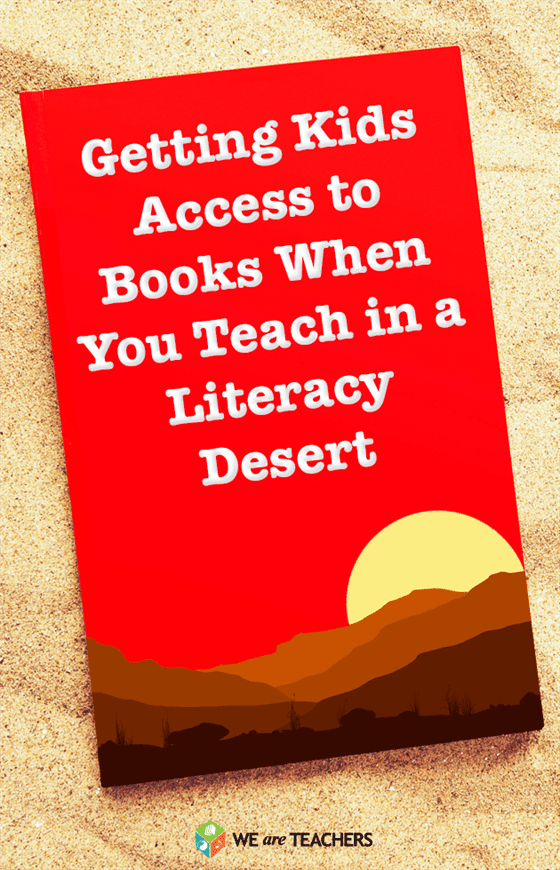Five years ago, I took a job as an ESL teacher at an elementary school on the east side of town. It wasn’t my first time teaching at a low-income school, or working with English learners. I wasn’t new to the district, or to the profession, but there was something different this time.
We’ve seen many studies in recent years on the correlation between a child’s access to books and their long-term academic success; how a lack of books in the home puts kids raised in poverty at a significant disadvantage. I knew what a “book desert” was, but for the first time in my career, I found myself teaching in one.
It’s a complex problem. My school busses in students from neighborhood trailer parks and temporary apartments. The nearest public library is a 45 minute walk away. When parents work double shifts and students are responsible for their younger siblings, that library may as well be in the next state over.
Yes, I would do the job for which I was hired. I would teach those kids English, but I’d also do what I could to tip the balance back in their favor.
I began by turning the shelves of my office into a lending library. I discovered that a secondhand store on the west side of town sold barely-used children’s hardbacks at bargain prices. I set up an account on DonorsChoose.org, and complete strangers from around the country chipped in to help purchase dual language books and audio books so kids could read with their parents, no matter what language was spoken in the home. I decorated shoeboxes with my students so they would have their own “bookshelves” for storing their home libraries. Over the winter holidays, I sent home plastic bags stuffed with books culled from the resource room and classrooms.
Each year as the snow melted and warmer months beckoned, I worried, what would my students do when the school doors shut and my little lending library closed for the summer? Luckily for these kids, a mobile library had already identified the lack of resources in the area and set up regular visits to my students’ neighborhoods.
Problem solved!
One by one, I walked my students through the registration process. We set up online accounts, and reserved books they were excited to read so when the bookmobile rolled into the neighborhood, they’d run to be the first in line all summer long.
It worked! For some.
Parents raising kids in poverty often have to make really difficult decisions: to pay the electric bill or to buy groceries, to fill the gas tank or to buy a new pair of shoes. In those situations, paying fines for late library books quickly becomes untenable.
It broke this book-lover’s heart to hear my students say, “My parents won’t let me check out library books anymore because we can’t afford to pay the fines.”
Problem not yet solved.
My students not only needed the books to come to them, but they also needed those books to be free. At the time, Little Free Libraries were popping up all over the place—near bookstores, in front of homes, and in city parks. My co-teacher, Sarah, and I searched within our district boundaries, and found none. There, it seemed, was our answer.
We knew this project was bigger than the two of us, so we rolled up our sleeves and set about winning the support of our community. We wrote grants to the school district’s Education Foundation, approached the district facilities crew about constructing and planting tiny buildings to protect the books from our harsh climate, and we sorted and stickered thousands of books.
Every teacher wants to make a difference, to feel like they’ve left something meaningful behind when they go. The day Sarah and I filled our first library, I think we both knew this was our thing. Long after our students had forgotten our names, lives would be changed by the presence of books in these neighborhoods. Each home wouldn’t have the dozens of books a middle-class family might, but in my students’ community, thousands would pass from home to home through the little door of our library.
It was indeed like watering the desert when our three libraries opened, like the first rains of the wet season sinking into cracks in the earth as soon as they touched down. We refilled our libraries again and again in those thirsty months, as quickly as they were emptied. Over a year later, our libraries are thriving, and nearly self-sustaining.
And there’s nothing more lovely than the desert in bloom.
Melanie Crowder is the award-winning author of several books for young readers, including Audacity, A Nearer Moon and Parched, as well as the forthcoming An Uninterrupted View of the Sky and Three Pennies. The author lives on Colorado’s Front Range, where she has worked as an educator for more than a decade. Visit her online at www.melaniecrowder.com.

